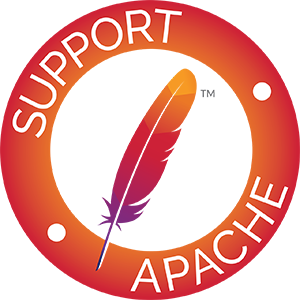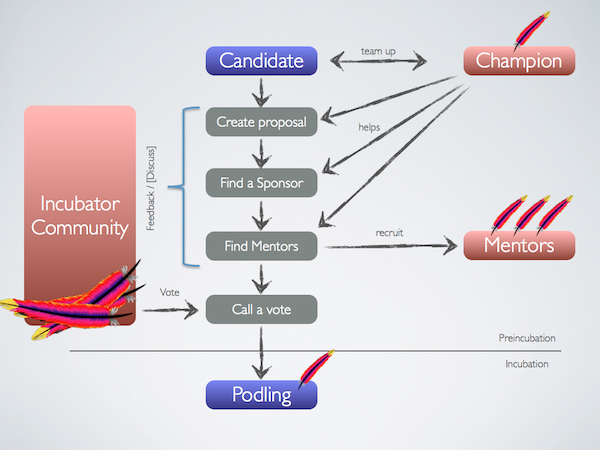 Incubation Process: Table of Contents
Incubation Process: Table of Contents
 Introduction
Introduction
This document is an overview of the process. Read it in conjunction with the "Incubation Policy" and the various guides. Also review the Roles and Responsibilities for a description of the various parties involved in the Incubation process.
 The Process of Incubation
The Process of Incubation
The incubation process covers the establishment of a candidate, acceptance (or rejection) of a candidate leading to the potential establishment of a Podling and associated incubation process, which ultimately leads to the establishment or a new Apache Top-Level-Project (TLP) or sub-project within an existing Apache Project.

Establishment
The first thing you will want to do is find a Champion for your project. One way to do this is to explore the existing Apache projects to find similar projects. Spend some time reading their project web pages and mailing lists (follow links at each project website). By simply lurking on the project mailing lists (and also the Incubator general list and other Incubating project lists) you may get ideas about who you would like to contact directly to help you with your project proposal.
Simply email that person directly (e.g. username@apache.org,
see the committer list to
find the username),
describe informally yourselves and your project,
and ask kindly if she would be willing to act as your Champion for
your project within the Apache incubator. Remember that all
Apache Committers and Members are volunteers with limited
spare time, but you will hopefully find that the person is
honoured by your request to be a Champion and sees a potential
for your project as a future Apache project.
Once you have found an eligible person who is willing to act as Champion, you can use this person to help you determine if and how your proposal can fit within the ASF, and if the "Apache Way" of open development would be right for your project. This might happen over a series of emails, telephone calls or online chat sessions, and should cover any practical concerns such as project infrastructure (e.g. mailing lists, web, source code repositories, issue tracker, wiki) but also the implications of licensing, governance and Intellectual Property management.
If you and your Champion are convinced that your candidate project would fit with the "Apache Way", your Champion can help you to get it established.
The establishment of a candidate involves the preparation of a Project Proposal (consistent with the candidate description detailed below) endorsed by a Champion.
A Candidate project description should be submitted to the relevant
mailing list(s) of a Sponsor. The Sponsor is usually the
Incubator (IPMC), (general@incubator.apache.org),
assuming your project would aspire to
become a top-level project (TLP). In the special case of your project aspiring to become
a sub-project of an existing Apache top-level project
(e.g. a plugin for Apache OpenOffice), then that project
should be your champion and their dev@ mailing list would
be where to send the proposal first.
Please see:
- a Guide to Proposal Creation
- existing project proposals for examples
Typically a Candidate is submitted under a message tagged with [PROPOSAL]. Such a message will normally trigger some discussions on the receiving mailing list(s). Your Champion will be involved in these discussions acting as your advocate.
As a proposer you should consider the feedback and attempt to gauge a sense of consensus. Do not be put off by extended threads under your initial post that have little or nothing to do with your proposal - however, if you feel that your candidate project is not being addressed, you may want to specifically request a decision on the Candidate by the Sponsor. Sometimes a vote will be announced without you asking for it (perhaps you have done some homework and have a PMC member assisting you though the process), other times you may need to cut through discussions and push your request forward for a decision.
Acceptance
The decision to accept a project is taken on a vote by the Sponsor. The format of this vote will depend on the rules of the entity in question. Here again it helps if you have a PMC Member (or board member if the Sponsor is the ASF board) aligned with your project (preferably as your Champion) because you stand a better chance of getting feedback about what is actually happening. The Sponsor will typically take about 7-10 days before announcing a vote result.
If that vote is affirmative, the Sponsor (unless the Sponsor is already the Incubator PMC) will propose to the Incubator PMC(referencing the voting result e-mail) that your candidate project be accepted by the Incubator as a Podling. The Sponsor will assign Mentors. The Mentors may include your original Champion. If not, it is expected your Champion will remain involved during the rest of the Incubation process, providing as much assistance as possible.
The Mentors are there to protect you, but be warned - Mentors are holding a big stick. The Mentors are members of the Incubator PMC, and report to both the PMC and the Sponsor about your overall health and suitability for eventual inclusion within the Apache Community (or recommendation to terminate). However, the Mentors (with the assistance of the Champion) are also looking after you through the incubation.
One of the roles of the Mentors is to keep away the wolves - and in the case of incubation the wolf is the Incubator PMC, the policies, the process, and inevitable bureaucracy and delays. The Mentors can help you by guiding and protecting you from much of this based on their experience in the process and familiarity with the policy and procedures of incubation. In performing their role, the Mentors are representing the Sponsor.
Your Sponsor, represented by your Mentors, has specific responsibilities towards you and the Incubator PMC. There are a bunch of administrative and technical actions to take care of. Your Mentors are responsible for ensuring that these things happen quickly and efficiently. Also, your Mentors are going to help you out with the getting in place of the policies and procedures you use for introducing new comitters, decision making, etc. These aspects will be watched closely by the Incubator PMC as they provide a good indication of community dynamics, health and correlation with Apache practices.
Review
As your project sorts things out and things stabilize (infrastructure, communications, decision making) you will inevitably come under an assessment by the Incubator PMC concerning the exit of your project from the incubator. Keep in mind that exit can be a good thing and bad thing. Exit via graduation to a top-level project or perhaps a subproject of an existing PMC would typically be viewed as a positive exit. On the other-hand, termination is also an exit condition that may be considered. With an upcoming assessment it is generally a good idea to have your STATUS file right up to-date and to ensure that your Mentor is doing his/her job of evangelizing your project and has good picture of where you are relative to acceptance or the last assessment point. This information will help the Incubator PMC to recommend the best action for your project.
Conclusion of a review process will be a recommendation (to the Sponsor) of one of the following:
- termination;
- continuation under incubation with recommendations; or
- graduation into Apache.
Note that whilst this is a recommendation, it carries a lot of weight. A Sponsor will only over-ride the recommendation of the Incubator in exceptional circumstances, and even then it is likely that the issue in question would be escalated to the ASF board for their consideration.
Termination or Retirement
There are two ways for a project to cease incubation: Termination or Retirement. If you receive a recommendation for termination then you have a problem. Chances are that there are either legal or structural problems with your project that in the opinion of the Incubator PMC are not resolvable within a reasonable time frame. A termination decision is basically time to close down the project. However, you do have the right to appeal a termination decision with the Board of Directors and/or your Sponsor. You should be aware that several Members of the Board are also Members of the Incubator PMC and as such, an appeal is unlikely to be successful. Retirement is typically an internal decisions by PPMC. A retired project is a project which has been closed down by the PPMC or by the IPMC for various reasons. It is not longer developed at the Apache Incubator and does not have any other duties. Retirement can also be suggested by IPMC on the grounds of lack of releases for more than a year. However, since unlike termination, retirement is a voluntary process, the suggestion will have to be discussed and voted upon. It's important to view this process as being the retirement of the podling community, not the code. It should not be implied that the code is not for use - just that it has no community. The source code of a retired project is available in ASF repository, when the copyright requirements are fullfilled. This is indicated through the incubator status page. For more details on Retirement please see our Guide to Retirement
Continuation
A recommendation by the Incubator PMC for continuation of incubation shall include development recommendations. The Incubator PMC has a responsibility to ensure that the recommended actions are tangible and quantifiable. For example, an assessment could be that your project has not established a sufficient community to be viable, in which case the Incubator PMC is obliged to state specific targets that they consider as viable. This does not necessarily mean that if you meet this target by the next review that you are out of incubation - but it does give you concrete achievements that you can cite. Your Mentor is also specifically accountable to you for ensuring that the recommendations for continuation are usable, substantive and tangible. If this is not the case, you have every right to appeal an Incubator decision to the Apache Board. However, if your Mentor is doing a good job, neither of these scenarios should arise.
Graduation
For Podlings that aim to establish sub-projects or products within existing communities you are almost home-free. The main issues you need to deal with now is migration of your code into the target project, something you should be confident in doing based on the contacts and understanding you gained during initial establishment and incubation.
For projects aiming to be a Top-Level-Project (TLP), you have an additional obstacle, namely the ASF Board. While the ASF Board might be your Sponsor, this does not mean they have formally accepted you as a TLP. To establish a TLP you need to draft a board motion that identifies the project scope, mission and charter. You can submit the motion to the Board using the board at apache dot org email address. Well-prepared projects will have already developed contacts with members of the Board so this should not be a surprise agenda item. Keep in mind that the Board can approve your motion as supplied, amend it, or reject it. If you are rejected then you need to sort this out with the Incubator PMC and allies you have developed during the incubation process. In other words, for a TLP objective the Incubator PMC okay is only half of the story.
However, in practice, assuming you are building contacts with members in Apache, the Incubator PMC, and the ASF Board, the transition from Podling to TLP should be a smooth and painless process.



